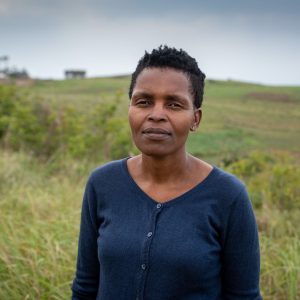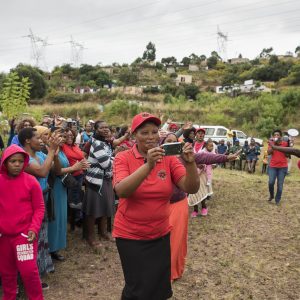A just society will be first prize for S’bu Zikode
Keeping his scout’s promise is how the leader of Abahlali baseMjondolo views his work as a land rights champion and defender of the oppressed, for which he has been recognised.
Author:
14 April 2021

S’bu Zikode, president and co-founder of Abahlali baseMjondolo, says he is dedicating the Per Anger Prize he will soon be receiving to the fallen heroes of the shack dwellers’ movement, as well as the working class and all oppressed communities around the world. “Our struggle is just and it is legitimate,” said Zikode. “I hope this prize shows that the world is watching, we mustn’t lose hope. Hard work pays off no matter how long it takes.”
Awarded by the Swedish government in recognition of work to promote human rights and democracy, the prize will be handed to Zikode on 21 April in recognition of his work in the struggle for land and to affirm the dignity of impoverished people. It was established in 2004 in recognition of diplomat Per Anger’s courage during World War II, when he saved tens of thousands of Hungarian Jews from the Holocaust.
Like many members of Abahlali baseMjondolo, Zikode has been abused by the police. Over the years, there have been threats on his life. Eighteen members and supporters of the movement have been killed. But Zikode believes it has been worth it and says he is deeply honoured and joyful that his work has been recognised.
Related article:
“When you are in the space of social justice, you don’t really expect any compensation, remuneration or any sort of prize, because for me I took an oath as a young boy in the Scouts Association that I will fulfil my duty to God, to my country and to the world. This sense of responsibility has been evident to me when it got tough, and the only prize that seemed feasible for the struggle was death,” said Zikode.
Abahlali baseMjondolo first became known for taking up issues pertaining to the housing crisis in Durban, KwaZulu-Natal. It is estimated that more than a million people in the city require housing, and there is intense – and often violent – competition for urban land.
Many people have responded to their exclusion from access to housing by occupying land in and around the city. Municipal officials and the police often respond violently to these occupations, while local political elites try to seize control of the settlements.
Huge numbers of people remain vulnerable in shack settlements that have no electricity, water or toilets, making them prone to fires from paraffin stoves or candles falling over. One fire can leave hundreds of people homeless overnight as the shacks are extremely close to one another, and the lack of roads means fire rescue services cannot enter to douse the flames.
An endless battle
Zikode and Abahlali baseMjondolo fight day after day for land and housing as well as democratic forms of decision-making and development to build social solidarity and popular power from below. The movement has been so successful that it has extended its reach beyond Durban and KwaZulu-Natal to four other provinces.
Having grown up impoverished in a rural area near Escourt, Zikode says he never imagined his life would turn out this way, with him winning the Per Anger Prize for leading an 85 000-strong land rights movement that has organised regular land occupations and spearheaded many court battles against evictions in shack settlements. Abahlali baseMjondolo has also organised to oppose violence against women and migrants.
Zikode says all he wanted to do was to become a lawyer, but the urgency of changing the lives of the shack dwellers in Kennedy Road, where he was living when the organisation was founded in 2005, derailed that dream as the organisation grew larger and more demanding.
Related article:
“When I look back on my life as a young boy being introduced to the Boy Scouts Association, it shaped my life, taught me leadership skills, made me care about community-building and instilled my love for my country. Principles such as respect, helping your fellow man and ubuntu informed a lot of what we pride ourselves in at Abahlali. We got trained to survive in the wilderness and got trained like soldiers, and unbeknownst to me that prepared me for the difficult life ahead, and I am grateful for my background,” said Zikode.
Zikode has travelled to many countries around the world to meet with activists, share experiences and teach. At home he has faced arrest, torture and regular death threats. Twice he has had to live without contact with family, friends and comrades for long periods.
“Several times I had to live in safe homes, go underground, or leave my family to go abroad. I had sleepless nights while I was away from my family, worried about their safety as well. I used to feel my life was under the shadow of death, but my faith and spirituality kept me strong because I realised this job chose me and that I will not die until the mission is fulfilled and accomplished,” said Zikode.
Strength and resolve
A car he was using was tampered with in 2018, resulting in an accident, but the incident that was definitive in his struggle was when he was wrongfully arrested and brutally assaulted by the police in 2006. Zikode was on his way to Gagasi FM, formerly known as P4 Radio, with his comrade Philani Zungu, then deputy chairperson of the movement. They were going for a live debate with the minister of housing at the time.
On the way, they were stopped by the police, handcuffed and taken to the police station, where they were charged with seven fabricated “crimes”. It became apparent that something was wrong when they were taken to an office instead of the holding cells. The then station commander, Glen Nayager, along with seven police officers, began assaulting Zikode and Zungu.
Related article:
“While Nayager banged my head against the wall, he kept on saying, ‘Do you think you are Jesus Christ? Do you think you can save all these mjondolos [shacks]?’ When I looked at my comrade Philani, the seven officers had beaten him so badly his neck seemed twisted in the wrong direction and he was unconscious.
“Immediately after the attack we were thrown into the holding cells and refused medical attention. So there I was with my head and face swollen, in so much pain, and I had to ask myself if I would quit after this or continue fighting.
“The next morning I was still questioning whether to continue or quit, but when I came into court and Abahlali had filled it to capacity, donning their red T-shirts, I immediately knew that this was worth continuing. I knew I would never stop.”
The pair fought the false charges, which were dropped, and then sued the police and won. This would be one of the many court victories over the next 15 years that mark the strained relationship between Abahlali baseMjondolo, the police and those in power, who have constantly responded with violence to the movement’s attempts to fight for shack dwellers.
“What matters to us is human life. It doesn’t matter if you live in a fallen shack, it doesn’t matter how ugly your situation is, but you deserve to live in a respected and dignified manner,” said Zikode.



